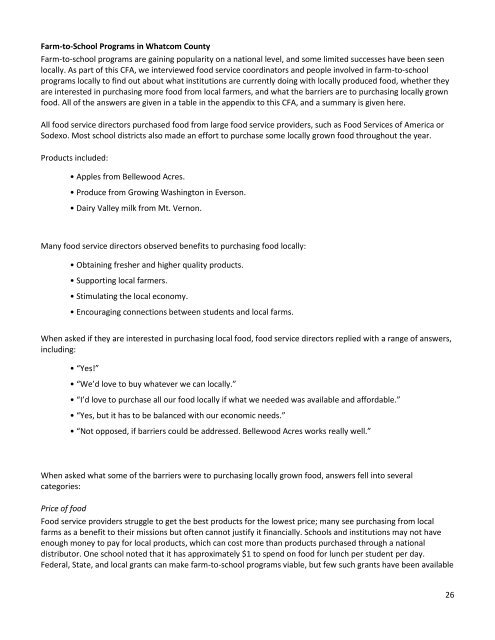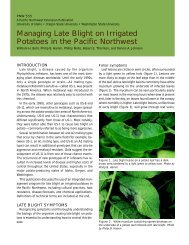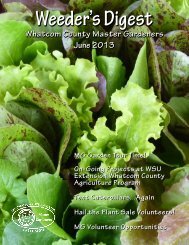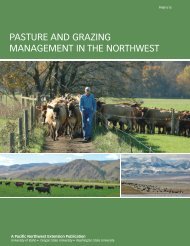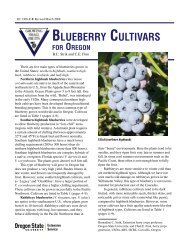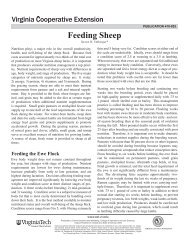Where Does Whatcom County Get its Food? - WSU Whatcom ...
Where Does Whatcom County Get its Food? - WSU Whatcom ...
Where Does Whatcom County Get its Food? - WSU Whatcom ...
Create successful ePaper yourself
Turn your PDF publications into a flip-book with our unique Google optimized e-Paper software.
Farm-to-School Programs in <strong>Whatcom</strong> <strong>County</strong><br />
Farm-to-school programs are gaining popularity on a national level, and some limited successes have been seen<br />
locally. As part of this CFA, we interviewed food service coordinators and people involved in farm-to-school<br />
programs locally to find out about what institutions are currently doing with locally produced food, whether they<br />
are interested in purchasing more food from local farmers, and what the barriers are to purchasing locally grown<br />
food. All of the answers are given in a table in the appendix to this CFA, and a summary is given here.<br />
All food service directors purchased food from large food service providers, such as <strong>Food</strong> Services of America or<br />
Sodexo. Most school districts also made an effort to purchase some locally grown food throughout the year.<br />
Products included:<br />
• Apples from Bellewood Acres.<br />
• Produce from Growing Washington in Everson.<br />
• Dairy Valley milk from Mt. Vernon.<br />
Many food service directors observed benef<strong>its</strong> to purchasing food locally:<br />
• Obtaining fresher and higher quality products.<br />
• Supporting local farmers.<br />
• Stimulating the local economy.<br />
• Encouraging connections between students and local farms.<br />
When asked if they are interested in purchasing local food, food service directors replied with a range of answers,<br />
including:<br />
• “Yes!”<br />
• “We’d love to buy whatever we can locally.”<br />
• “I’d love to purchase all our food locally if what we needed was available and affordable.”<br />
• “Yes, but it has to be balanced with our economic needs.”<br />
• “Not opposed, if barriers could be addressed. Bellewood Acres works really well.”<br />
When asked what some of the barriers were to purchasing locally grown food, answers fell into several<br />
categories:<br />
Price of food<br />
<strong>Food</strong> service providers struggle to get the best products for the lowest price; many see purchasing from local<br />
farms as a benefit to their missions but often cannot justify it financially. Schools and institutions may not have<br />
enough money to pay for local products, which can cost more than products purchased through a national<br />
distributor. One school noted that it has approximately $1 to spend on food for lunch per student per day.<br />
Federal, State, and local grants can make farm-to-school programs viable, but few such grants have been available<br />
26


